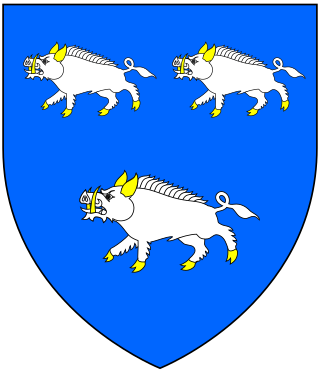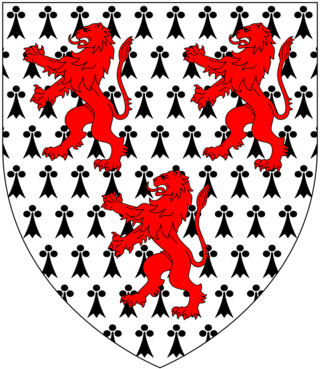Related Research Articles

William Juxon was an English churchman, Bishop of London from 1633 to 1646 and Archbishop of Canterbury from 1660 until his death.

Philip Massinger was an English dramatist. His finely plotted plays, including A New Way to Pay Old Debts, The City Madam, and The Roman Actor, are noted for their satire and realism, and their political and social themes.
Richard Senhouse was an English churchman, Bishop of Carlisle from 1624 to 1626.
Sir Robert Killigrew (1580–1633) was an English courtier and politician who sat in the House of Commons at various times between 1601 and 1629. He served as Ambassador to the United Provinces.

Thomas Howard, 1st Earl of Berkshire was an English politician who sat in the House of Commons between 1605 and 1622. He was created Earl of Berkshire in 1626.

James Ley, 1st Earl of Marlborough was an English judge and politician who sat in the House of Commons at various times between 1597 and 1622. He was Lord Chief Justice of the King's Bench in Ireland and then in England, and was Lord High Treasurer from 1624 to 1628. On 31 December 1624, James I created him Baron Ley, of Ley in the County of Devon, and on 5 February 1626, Charles I created him Earl of Marlborough. Both titles became extinct upon the death of the 4th Earl of Marlborough in 1679.

John Finch, 1st Baron Finch was an English judge, and politician who sat in the House of Commons at various times between 1621 and 1629. He was Speaker of the House of Commons.

Sir Eubule Thelwall was a Welsh lawyer, academic and politician who sat in the House of Commons between 1624 and 1629. He was principal of Jesus College, Oxford, from 1621 to 1630.
Henry Pelham was an English lawyer and politician who sat in the House of Commons between 1621 and 1648. He was Speaker of the English House of Commons for a short time in 1647.

Sir Heneage Finch was an English nobleman, lawyer, Member of Parliament, and politician who sat in the House of Commons at various times between 1607 and 1626. He was Speaker of the English House of Commons in 1626.
David Dolben (1581–1633) was a Welsh bishop of Bangor.
Sir Thomas Fanshawe KB was an English government official and politician who sat in the House of Commons between 1601 and 1629.
Sir Richard Cecil was an English politician who sat in the House of Commons at various times between 1593 and 1622.

John Bampfield of Poltimore House and North Molton, Devon, England, was a Member of Parliament for Tiverton in Devon (1621) and for the prestigious county seat of Devon (1628-9).

Barnabas Gooch or Goche or Gough was an English lawyer and academic who was Vice-Chancellor of the University of Cambridge from 1611 to 1612. He was also a politician who sat in the House of Commons from 1621 to 1624.
Richard Taylor was an English lawyer and politician who sat in the House of Commons from 1621 to 1629.
Sir Francis Carew (1602–1649) was an English politician who sat in the House of Commons between 1624 and 1626.

Sir John Chudleigh was an English politician who sat in the House of Commons in 1626.
Sir Arthur Lake (1598–1633) was an English politician who sat in the House of Commons from 1624 to 1626. His reputation was badly damaged by the notorious Lake-Cecil feud which lasted from 1617 to 1621, and both scandalised and fascinated the Jacobean Court.
Edward Popham (1581–1641) was an English Member of Parliament for Bridgewater in 1621, 1624, 1625 and 1626, and was also Sheriff of Somerset for the year 1622/23.
References
- 1 2 3 Foster, Joseph (1888–1892). . Alumni Oxonienses: the Members of the University of Oxford, 1500–1714 . Oxford: Parker and Co – via Wikisource.
- ↑ "Gifford, - (GFRT599-)". A Cambridge Alumni Database. University of Cambridge.